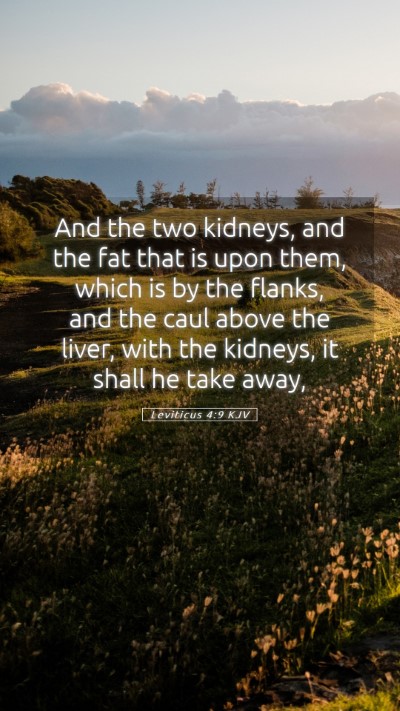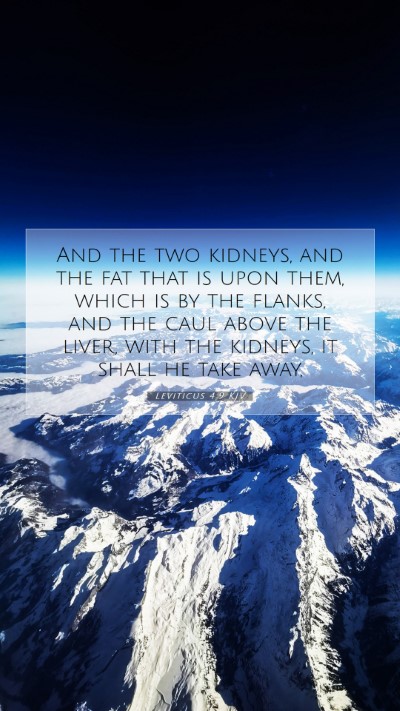Understanding Leviticus 4:9
Bible Verse: Leviticus 4:9 - "And the fat of the sin offering shall be taken off, and the fat that covers the inward parts, and all the fat that is upon the inward parts."
Introduction to Bible Verse Meanings
Leviticus 4:9 is a significant text within the context of the sacrificial system established in the Old Testament. Understanding this verse provides deep insights into the biblical principles of atonement and the holiness of God. This explanation draws from insights by renowned commentaries such as Matthew Henry, Albert Barnes, and Adam Clarke.
Bible Verse Interpretations
The primary focus of this verse is on the specifics regarding the sin offering, particularly the components that are to be removed and offered to God. This reflects the meticulous nature of God's law and outlines the requirements for making atonement for sin.
Key Insights from Commentaries
- Matthew Henry: Henry emphasizes the process of the sin offering, noting that the fat, often associated with wealth and abundance, signifies the best portion being dedicated to God. This act symbolizes the importance of offering one's best in repentance.
- Albert Barnes: Barnes provides an analysis of the sacrificial system, explaining that the fat in the sin offering represents the life force of the animal, which is pleasing to God. This indicates the seriousness of sin and the need for a genuine sacrifice as a means of reconciliation.
- Adam Clarke: Clarke details the significance of the inward parts and their connection to the emotional and spiritual state of the offerer. He explains that by removing these parts, the worshipper acknowledges that they are giving their whole self to God, which is central to the concept of atonement.
Scripture Analysis
This verse not only addresses the physical act of sacrifice but also holds a deeper spiritual meaning that ties back to the nature of sin and God's provision for forgiveness. Here's a breakdown of essential themes:
Theological Themes:
- Atonement: The sin offering illustrates the need for atonement in human relationships with God. This is a consistent theme throughout the Scriptures and forms the foundation of biblical exegesis regarding sin and reconciliation.
- Holiness of God: The detailed sacrificial process highlights God's holiness and the seriousness of approaching Him. It stresses that God desires a pure offering, which was foreshadowed in the ultimate sacrifice of Jesus Christ.
- Symbolism of Fat: The fat, often considered the best part, symbolizes giving one's best to God, reinforcing the principle that worship should be sincere and sacrificed from the heart.
Understanding Scripture Through Historical Context
Leviticus was written as part of the Mosaic law, following the Exodus from Egypt. Understanding the historical context enhances our comprehension of this verse:
- The Israelites were called to follow strict guidelines to set themselves apart as God's chosen people.
- The sacrificial system was instituted as a means to deal with sin and maintain a right relationship with God.
Applying Bible Verses to Daily Life
Understanding Leviticus 4:9 encourages believers to reflect on what it means to bring their offerings to God, not just in terms of physical sacrifices, but in spiritual life and daily living:
- Consider what it means to offer your "best" to God in your time, talents, and resources.
- Reflect on the importance of repentance and confession in maintaining a right relationship with God.
Related Bible Cross References
- Exodus 29:13: Discusses the consecration of the priests and similar sacrificial practices.
- Leviticus 3:3: Details regarding the fat and its significance in other types of offerings.
- Hebrews 9:22: Establishes the necessity of blood for the remission of sins, linking Old Testament practices to New Testament theology.
Conclusion
In summation, Leviticus 4:9 serves as a powerful reminder of the depth of sin and the seriousness with which God regards the need for atonement. Through careful study and understanding of this verse, we gain valuable Bible study insights that reveal God's grace and call to holiness. For those engaged in Bible study groups, online Bible study, or conducting personal study, this verse offers a rich foundation for understanding the process of reconciliation with God.


